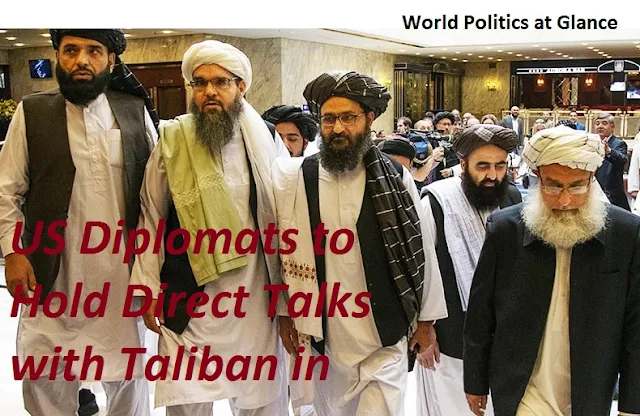 |
| Image Credit: Google |
US Diplomats to Hold Direct Talks with Taliban in Qatar Amid Afghanistan Concerns
United States diplomats will engage in rare, direct talks with Taliban representatives in Qatar this week, as announced by the US State Department.
Thomas West and Rina Amiri, the US special representatives for Afghanistan and Afghan women, girls, and human rights respectively, will meet with representatives from Kazakhstan, the Kyrgyz Republic, Tajikistan, Turkmenistan, and Uzbekistan in Astana, Kazakhstan, to discuss Afghanistan.
Following the Kazakhstan meetings, West and Amiri will hold discussions with a delegation of Taliban representatives and other Afghan ministry officials in Doha, Qatar.
The focal points of the Doha meeting will include "Critical Interests in Afghanistan."
According the State Department, the talks will also include:
- Humanitarian Support,
- Economic Stabilization,
- Dignified Treatment of all Afghans,
- Security Concerns, and
- Efforts to Counter Narcotics Production and Trafficking.
Background
US forces withdrew from Afghanistan in August 2021, ending a 20-year war, which led to the Taliban's takeover as the country's Western-backed government collapsed.
Despite the withdrawal, the US has not recognized the Taliban government in Kabul and has imposed sanctions against the group and its leaders.
Spokesperson Vedant Patel clarified that the upcoming Doha meetings do not signify a change in the US position.
"We have been very clear that we will engage with the Taliban appropriately when it is in our interest to do so,"
Patel stated, emphasizing that it does not imply recognition, normalization, or legitimacy of the Taliban.
Since reclaiming power in 2021, the Taliban has faced international condemnation, particularly from Muslim-majority countries, for imposing restrictive measures on women's education.
The group has banned women from attending university and girls from going to school beyond the sixth grade.
Additionally, they recently imposed a ban on women's beauty parlors.
Late last year, US Secretary of State Antony Blinken warned the Taliban of potential consequences if they fail to reverse their policies on women's and girls' education.
Afghanistan continues to grapple with a humanitarian crisis, with nearly half of its population, approximately 23 million people, relying on assistance from the World Food Programme (WFP) last year.
Taliban officials have indicated their willingness to collaborate with the US, contingent on Washington lifting its sanctions against the group.
The US-led coalition invaded Afghanistan in 2001 following the 9/11 attacks by al-Qaeda, who were hosted by the Taliban at the time.
The war became America's longest armed conflict, and in 2020, former President Donald Trump signed an agreement with the Taliban to withdraw US troops from Afghanistan, a decision honored by President Joe Biden, although it was met with criticism due to the chaotic withdrawal.
Internal reviews have recognized shortcomings in the withdrawal's
execution while also criticizing Trump for not planning adequately after the
2020 agreement.
Post a Comment
0Comments